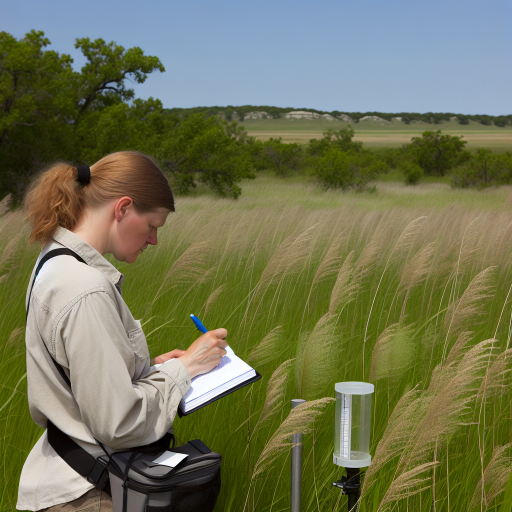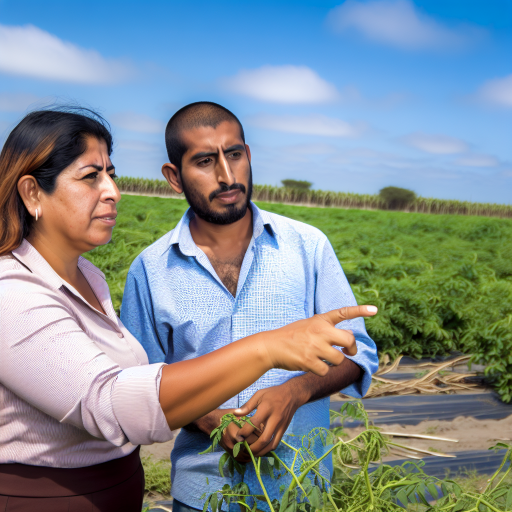Introduction
Organic farming is a method that relies on natural inputs and processes to grow crops.
It avoids the use of synthetic chemicals and pesticides.
Implementing organic farming methods is crucial for promoting sustainability.
It helps reduce environmental impact and ensure food safety.
Understanding the basics of organic farming
Organic farming can be defined as a method of growing crops using natural inputs without the use of synthetic chemicals.
The principles of organic farming include practices such as crop rotation, composting, and biological pest control.
Difference between conventional and organic farming methods
- Conventional farming relies on synthetic fertilizers and pesticides, while organic farming uses natural inputs.
- Organic farming promotes soil health, biodiversity, and sustainable farming practices compared to conventional methods.
Importance of Soil Health in Organic Farming
Healthy soil provides essential nutrients for plant growth.
It supports beneficial microorganisms that aid in nutrient cycling.
Good soil structure promotes proper drainage and aeration.
Healthy soil helps plants resist pests and diseases naturally.
By conducting a soil analysis, farmers can gain valuable insights into the current state of their soil.
This process helps identify any deficiencies or imbalances.
Farmers can then make informed decisions on how to improve soil health to maximize crop yields.
Steps to Conduct a Soil Analysis
- Collect soil samples from different areas of the farm.
- Use a soil probe or shovel to collect samples from the topsoil.
- Combine samples in a clean bucket and mix thoroughly.
- Allow the soil to dry before sending it to a laboratory for analysis.
- Choose a reputable soil testing lab for accurate results.
- Provide necessary information about the crops you plan to grow.
- Wait for the results and carefully review the analysis report.
Interpreting the results of a soil analysis is essential for determining the next steps in improving soil health.
The report will typically include information on pH levels, nutrient content, organic matter, and recommendations for amendments.
By regularly conducting soil analyses, farmers can monitor changes in soil health over time.
This proactive approach leads to sustainable crop production and improved resilience to environmental challenges.
Gain More Insights: Supporting Local: The Rise of Community Supported Fisheries
Factors to Consider
Climate is crucial when selecting crops.
Choose crops that are well-suited to the climate of your region for optimal growth.
Transform Your Career Today
Unlock a personalized career strategy that drives real results. Get tailored advice and a roadmap designed just for you.
Start NowSoil type impacts crop selection.
Different crops thrive in different soil types.
Ensure you select crops that will flourish in your specific soil conditions.
Market demand must guide your choices.
Research the market demand for various crops to ensure you can sell your produce effectively.
Benefits of Crop Rotation
Crop rotation is a key practice in organic farming.
This method involves planting different crops in a sequential order over several seasons.
Enhanced soil fertility results from rotating crops.
Rotating crops helps maintain soil health and fertility.
Pest and disease control is another benefit.
Crop rotation minimizes pest and disease infestations by interrupting their life cycles.
Weed suppression is crucial.
Rotating crops can help suppress weed growth.
This reduces the need for herbicides.
Importance of Diversification
Diversifying crops on your organic farm brings numerous benefits.
This practice contributes to overall sustainability.
Resilience to climate change is a significant advantage.
Diversifying crops helps your farm adapt to changing climate conditions.
Improved nutrient cycling occurs with crop variety.
Different crops have varying nutrient needs.
Transform Your Career Today
Unlock a personalized career strategy that drives real results. Get tailored advice and a roadmap designed just for you.
Start NowThis diversity enhances nutrient cycling on your farm.
Market stability is also a key factor.
Growing a variety of crops can hedge against market fluctuations.
This ensures a stable income for your farm.
By carefully selecting crops, practicing crop rotation, and embracing diversification, you can set your organic farm up for success.
This approach fosters sustainability in the long run.
Gain More Insights: Health Benefits and Risks: Life as a US Fisherman
Implementing Organic Farming Methods Successfully
Organic farming is gaining popularity due to its sustainable and eco-friendly practices.
One key aspect of successful organic farming is implementing natural pest control methods.
Here are some tips on how to effectively manage pests and diseases in organic farming:
Identify common pests and diseases in organic farming:
-
Conduct thorough research on the common pests and diseases affecting crops in your region.
-
Keep a close eye on your plants for any signs of pest infestations or disease outbreaks.
-
Consult with local agricultural experts or extension services to identify specific pests and diseases in your area.
Explore eco-friendly pest control methods:
-
Companion planting involves growing certain plants together to deter pests or attract beneficial insects.
-
For example, planting marigolds alongside tomatoes can help repel nematodes and whiteflies.
-
Biological controls use natural predators or pathogens to manage pest populations.
-
Introduce beneficial insects like ladybugs or lacewings to prey on harmful pests like aphids or caterpillars.
-
Use microbial biopesticides like Bacillus thuringiensis (Bt) to target specific insect pests while minimizing harm to beneficial organisms.
Implementing these organic pest control methods requires careful planning, monitoring, and flexibility.
It may take time to see results, but the long-term benefits of healthier soil, crops, and ecosystems make it all worth it.
By taking a proactive and holistic approach to pest management, organic farmers can reduce reliance on synthetic pesticides.
This creates a more sustainable agricultural system.
You Might Also Like: Popular Fish Species Targeted by US Fishermen
Maintaining Soil Fertility in Organic Farming
Maintaining soil fertility is crucial in successful organic farming practices.
There are several methods that can be implemented to achieve this goal.
1. Use of Compost
Compost is a key component in organic farming.
It helps improve soil structure, texture, and fertility.
By using compost, farmers can provide essential nutrients to the soil in a natural and sustainable way.
Transform Your Career Today
Unlock a personalized career strategy that drives real results. Get tailored advice and a roadmap designed just for you.
Start NowIt also helps retain moisture, reduce erosion, and suppress plant diseases.
2. Cover Crops
Cover crops play a vital role in maintaining soil fertility.
They protect the soil from erosion, increase organic matter, and suppress weeds.
These crops also help fix nitrogen in the soil, benefiting plant growth.
Additionally, cover crops improve soil structure and biodiversity.
3. Green Manure
Green manure is another effective way to enhance soil fertility.
This method involves growing specific crops that are then incorporated into the soil.
Green manure adds organic matter and nutrients and improves soil structure.
It also increases microbial activity, aids in weed suppression, and reduces the need for synthetic fertilizers.
4. Importance of Soil Amendments
Soil amendments are essential in organic farming.
They ensure the soil is enriched with necessary nutrients for plant growth.
These amendments help balance soil pH, improve structure, and enhance nutrient availability.
Using organic soil amendments like compost and manure allows farmers to maintain soil fertility without relying on synthetic chemicals.
Find Out More: The Future of Fishing in America: Trends and Predictions

Water management in organic farming
Water is a precious resource in organic farming.
It plays a crucial role in ensuring the success of crops.
Efficient water management is essential for sustainable and environmentally friendly agriculture practices.
Significance of efficient water use
- Conserves water resources
- Reduces water wastage
- Promotes soil health
- Enhances crop yield
- Minimizes environmental impact
By employing efficient water use practices, organic farmers can optimize resources.
These practices improve the overall health of their farms.
Strategies for water conservation and irrigation in organic farming
- Implement rainwater harvesting techniques
- Utilize drip irrigation systems
- Practice mulching to retain soil moisture
- Rotate crops to reduce water demand
- Monitor soil moisture levels regularly
- Use cover crops to prevent evaporation
- Adopt water-efficient farming methods
- Invest in water-saving technologies
These strategies help organic farmers conserve water.
Transform Your Career Today
Unlock a personalized career strategy that drives real results. Get tailored advice and a roadmap designed just for you.
Start NowThey also contribute to the overall sustainability of their operations.
Monitor and Evaluate Organic Farming Practices
Implementing organic farming methods successfully is not just about starting off on the right foot.
It’s also about continuously monitoring and evaluating your practices to ensure long-term success.
Monitoring and evaluation are crucial steps in the organic farming journey.
They allow you to track your progress, identify areas for improvement, and make necessary adjustments along the way.
Importance of Tracking Progress and Making Adjustments
- Tracking progress helps you assess the effectiveness of your organic farming practices.
- It allows you to measure the impact of your efforts on soil health, crop growth, and pest control.
- By monitoring and evaluating, you can identify strengths and weaknesses in your farming methods.
- Regular tracking helps you stay on course and make informed decisions to optimize your organic farming practices.
- Making adjustments based on your evaluation results is key to adapting to changing conditions and improving outcomes.
- Continuous monitoring ensures that you are proactive in addressing any issues that may arise in your organic farming operation.
Methods for Monitoring Soil Health, Crop Growth, and Pest Control
Monitoring soil health, crop growth, and pest control are essential aspects of successful organic farming.
Here are some effective methods for keeping track of these key components:
Soil Health
- Regularly conduct soil tests to assess nutrient levels and pH balance.
- Observe soil texture, structure, and moisture content to gauge its overall health.
- Use cover crops and organic mulches to improve soil fertility and structure.
- Implement crop rotation practices to prevent soil depletion and maintain its health.
Crop Growth
- Monitor plant growth by observing plant size, color, and overall health.
- Keep track of flowering and fruiting patterns to assess crop development.
- Measure crop yield to evaluate the effectiveness of your farming methods.
- Record pest and disease incidences to identify factors affecting crop growth.
Pest Control
- Implement Integrated Pest Management (IPM) strategies to monitor pest populations.
- Use pheromone traps and sticky boards to monitor pest activity in the field.
- Regularly scout crops for signs of pest infestation and disease outbreaks.
- Implement natural predators and beneficial insects to control pest populations organically.
By diligently monitoring and evaluating your organic farming practices, you can make informed decisions.
Identify areas for improvement and ensure the long-term success of your operation.
Remember, successful organic farming is a journey that requires dedication, patience, and continuous improvement through monitoring and evaluation.
Organic Farming Methods
Organic farming methods involve avoiding synthetic pesticides.
These methods promote biodiversity and improve soil health.
By implementing these practices successfully, farmers can produce high-quality crops.
Additionally, they protect the environment through sustainable practices.
It is essential for farmers to continuously educate themselves on organic farming techniques.
Staying informed about the latest research is crucial.
Embracing organic farming benefits farmers’ health and the environment.
Moreover, it supports consumers’ well-being.
By choosing organic products, consumers contribute to sustainable agriculture practices.
This choice enhances the overall health of our planet.
Transform Your Career Today
Unlock a personalized career strategy that drives real results. Get tailored advice and a roadmap designed just for you.
Start NowIt’s time to make a shift towards organic farming for a healthier future.




